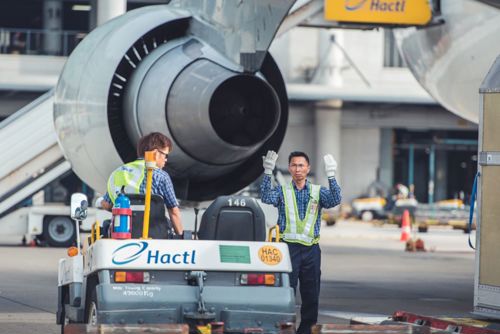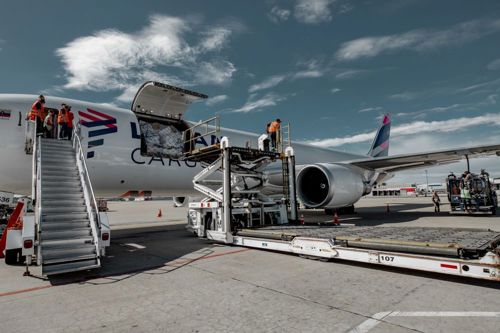
As the largest independent handler at the busiest cargo airport in the world, Hong Kong Air Cargo Terminals (Hactl) handles significant quantities of dangerous goods, including lithium batteries and products that contain them.
To make sure these products are handled correctly, Hactl has been conducting in-house dangerous goods training for decades, says Executive Director – Operations, Paul Cheng.
Since 2003, Hactl has been an IATA approved training centre, which is authorised to train its own and third party staff.
Staff receive IATA Dangerous Goods Regulations training and are kept up to date with IATA Lithium Battery Shipping Regulations.
Already in possession of IATA CEIV certificates for Pharma, Fresh and Live Animals, Hactl was accredited with Lithium Batteries (Li-batt) standards in October this year.
With highly-trained and competent staff, it was natural for Hactl to obtain Li-batt certification to prove its competency.
Cheng says, “Industry certifications don’t necessarily change or improve our processes and resources, but they do provide our customers with external verification of our capabilities. That’s why our policy is to achieve accreditation under every relevant new standard, and that was why we were an early adopter of IATA CEIV Lithium Batteries. We also feel it’s important that the whole industry works to the same recognised standards.”
Being ahead of the curve meant that practices and processes did not need to be upgraded but Hactl did streamline processes in a few areas such as creating a designated site plan and specific Cargo Operation Procedure for Lithium Battery handling.
Cheng says, “The process of obtaining the Lithium Battery accreditation informed our integrated training programme which is updated every six months with all the latest changes to regulations, and individual carriers’ latest requirements.”
Collaboration is key, and Hactl continues to work with IATA to raise standards even further. Hactl is the first cargo terminal operator in Hong Kong to achieve IATA’s new Competency-Based Training and Assessment (CBTA) Center Certification.
The safe handling and shipping of lithium batteries is a widely discussed issue; based on his experiences, Cheng does not believe that anybody would consciously or deliberately mis-declare dangerous good due to the risks and consequences being widely known.
He says, “Shipper ignorance of the correct procedures and packaging is a more likely reason for incorrect declarations or packaging, as a consequence of the recent growth of e-commerce and the number of new traders involved in this business.”
Hactl has a separate zone for dangerous goods, including lithium batteries, staffed by personnel who are fully-trained to check dangerous goods and lithium batteries and their packaging.
When a shipment of batteries arrive, the dedicated staff verify the documentation and prepare the dangerous goods checklist.
They check the cargo’s physical condition, its labels and compliance with IATA Dangerous Goods Regulations and any other requirements from the carrier.
Every shipment is securely stored in the dangerous goods handling area. If any noncompliance is found, the cargo is rejected, and if any risks are picked up, the airline is informed.
Cheng says, “Hactl’s stringent checking of shipments would ensure we spotted any misdeclarations, and our policy of taking training and guidance in correct practice to agents and shippers, helps to head off potential problems. As a result of all its stringent procedures, Hactl has not suffered any accident with lithium batteries to date.”
Volumes of lithium batteries will continue upwards, and so will awareness of the need to handle them properly, helped by initiatives such as CEIV Lithium Batteries.
There may be an argument for more legislation, increased penalties for contraventions and greater publicity, thinks Cheng.
He says, “If the Hong Kong CAD or any of our carrier customers ever embargo a shipper or agent due to previous concerns, their details are logged into our COSAC system resulting in automatic rejection of their shipments.”

Constant improvement
Continuously evaluating services and procedures to ensure the highest safety standards is the guiding principle of LATAM Group, and that applies to LATAM Cargo handling lithium batteries.
LATAM Cargo has been handling lithium batteries for years, being restrictive in the acceptance, handling and transportation of them.
It wanted to improve internal processes, and this is what IATA CEIV Lithium Batteries offered, says Diego Garcia, Cargo Operations Director.
LATAM Cargo is the first airline to be certified, with CEO Andres Bianchi picking up the certificate at the IATA World Cargo Symposium in London this September.
Certification is something Garcia and the team value, saying, “We are very proud to be the first airline to receive this certification, and at the same time hope that this motivates and pushes other airlines and industry players to obtain this certification.”
If more companies across the supply chain participate in the CEIV Lithium Battery programme, this will improve safety and efficiency, so LATAM Cargo will help to develop the programme further, says Garcia.
He says, “We expect the certification to evolve together with the safety standards of transporting lithium batteries, so all recertifications continue to prove the robustness of the certified companies.”
To manage and mitigate the risks associated with transporting lithium batteries, education and knowledge is key, with identifying and classifying the different types of batteries being very important, stresses Garcia.
He says, “This is where CEIV LiBa brings so much value to the industry, it allows each player to confirm that all the procedures they have in place for lithium batteries handling and transportation are very robust or to detect gaps and improve them until they reach that high level global standard.”
Concealed and mis-declared shipments, and misbehaviour from rogue shippers are major concerns for the industry, so robust processes have been put in place.
If there is an incident, authorities will be informed and LATAM Cargo will look at itself to see what improvements can be made.
Lithium batteries are everywhere, with LATAM Cargo handling double the volume of 2019, and the numbers will keep going up.
The e-commerce boom has increased the number of shipments containing lithium batteries, which also means safety considerations for when consumers return items.
Garcia says, “We expect the CEIV LiBa programme to evolve together with the safety standards of transporting lithium batteries, so all recertifications continue to prove the robustness of the certified companies. And we hope to see more supply chain players join the certification, which is better for the long-term since that will make it more comprehensive and prosperous.”

Tangible action
The safe handling of lithium batteries has been a discussion point for several years, and launching CEIV Lithium Batteries was tangible action to improve safety, says Peter Penseel, Chief Operating Officer Air Freight at CEVA Logistics, which was the first company to be certified.
The company had participated in industry dialogue and felt there was an urgent need to take action, so started discussions with IATA about the standard.
CEVA Logistics was the launch partner of the CEIV Lithium Batteries certificate, announcing the news at the IATA World Cargo Symposium last year (2021) in Dublin.
Penseel says, “Our combination of global scope, air freight capabilities and dangerous goods expertise put us in a great position to share, develop and pilot the programme alongside IATA.”
One year later, shippers are thrilled and employees appreciate the additional training, says Penseel, making it worth the investment.
He says, “The certification brings together numerous commitments to our customers, our employees and safety within the air cargo industry. As a result, we expect to continue expanding the certification’s presence across our global network.”
Penseel believes that the certification will improve the safe handling and transportation of lithium batteries but the industry needs support of regulatory and governmental bodies to enforce existing regulations to deter those threatening safety through false declarations and paperwork.
He says, “Such practices pose a safety threat to air cargo handlers, transport crews, and in the case of passenger cargo transport, the passengers and crews on board.”
The industry is taking steps to improve safety, adding, “There must be much stiffer penalties and real, consistent enforcement from local and international bodies to curtail false declarations from shippers willing to risk lives to avoid properly declaring shipment contents. People’s lives are at stake. The fact that we are still having this conversation year after year is concerning.”
Demand for lithium batteries is only going to rise, so will be transported across all modes of transport.
“The entire supply chain and companies at each step in the process must be committed to handling these products in the safest way possible,” he adds.
This article was published in the December 2022 issue of Air Logistics International, click here to read the digital edition and click here to subscribe.
